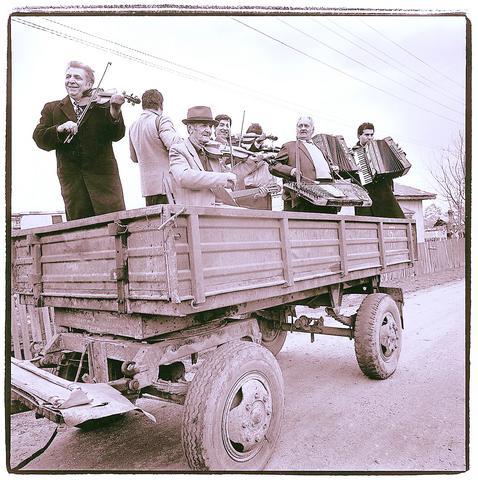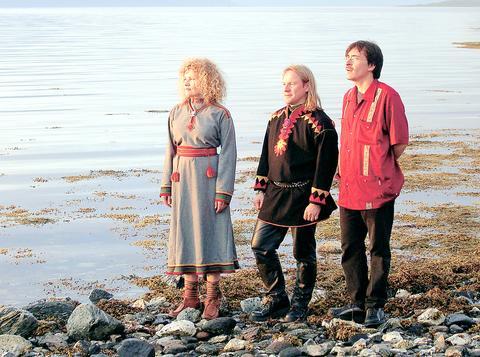The union of music and activism continues this weekend in Taipei with the third Migration Music Festival (
This year's theme, said Shih Fong Jihong (

PHOTO COURTESY OF TREES MUSIC MIGRATION MUSIC FESTIVAL
"Festivals can be used for people to celebrate different ethnic identities in the world and they can also address the mistreatment of minorities in society," said Jihong. "There are so many different cultures in the world and this is a good way to engage people from various backgrounds."

Inspired by the collective effort of Riddu Riddu, a large indigenous-music festival held in the small Norwegian village of Gaivuona, Jihong invited the event's founder, Henrik Olsen to speak at this year's Migration festival.
Rather than attend on his own, Olsen decided it would be more beneficial to bring a few Riddu musicians and organizers to share experiences with likeminded individuals in Taiwan. In the end, he could not raise enough money and had to downsize his delegation from five to three.

Olsen selflessly passed on his role as guest speaker to fellow Riddu organizer and Vajas member, Ande Somby. Although disappointed that Olsen will not be able to attend the show, Jihong is touched by his gesture.
"It is this kind of attitude that prompts people to get involved and volunteer in grassroots activities," she said. And it is the same attitude that prompted Jihong to launch the first Migration Music Festival in 2001.
"Our aim is not just a party with music but to involve people to encourage more educational activities."
The result is a weekend filled with options, including a documentary film festival and several workshops by program participants. One of the highlights promises to be a discussion led by Taiwanese documentary filmmaker Mayaw Biho, whose films deal with the ostracism of the Pangcah Aboriginal tribe.
The Sami, an indigenous people of northwestern Europe, are also a major focus of this year's show. Anita Lervolle, a Sami filmmaker, has captured the history and traditions of her people in a documentary film titled Greater Than Ourselves, which will be screened on Sunday. Ande Somby, co-founder of Riddu and a practising civil rights lawyer specializing in Sami law, will speak on how festivals can be used to raise issues of indigenous people's rights, in addition to the challenges of organizing such large events.
The major challenge of staging a Migration Music Festival, Jihong said, is the same as that of any non-commercial festival: funding. As a free event, the festival is run entirely on public donations, government sponsorship and volunteers.
The show will open with Taraf de Haidouks, a renowned Gypsy band from Romania. Ranging in age from 20 to 70 years of age, the 12 musicians have gained recognition across Europe where they've sold out venues in London and much of northern Europe. They've even become the talk of Hollywood, where according to online reviews, they have been flown out at the expense of Johnny Depp to play private parties in the US.
Sami vocalist Ande Somby will be heard with the accompaniment of fellow musicians who make up Vajas. Combing classical violin, melodic vocals and synthesized effects, Vajas is equipped to take listeners on a new age Arctic journey.
The Warsaw Village Band will perform a repertoire of Polish folk-dance melodies. Made up of six musicians playing string and percussion instruments, the group's formation stems from a desire to explore the folklore and sounds of their ancestors while maintaining a contemporary style.
What originated as a side project aimed at lifting the spirits of residents after the 1995 earthquake in Kobe, Japan, has lead to a fulltime gig for activist rockers, Soul Flower Mononoke Summit. Also know by its punk band alias, Soul Flower Union, the Japanese band performs acoustic material and rocked up versions of traditional Japanese folk songs.
From not so far away, Taiwan musicians Sheng Xiang and Water 3 (
Date with music:
FRIDAY: Official Festival Opening, at 7:30 with Taraf de Haidouks in Da'an Park
Saturday documentry:
2 pm: Storm Over Asia: The Heir of Genghis Khan
3:30 pm: Hakka Eight Tones
4:30 pm: Nul N'est Prophete en Son Pays
WORKSHOP:
2:30 pm: Warsaw Village Band
4:30 pm: Sheng Xiang & Water 3
GRAND STAGE:
7 pm: Vajas
8:30 pm: Warsaw Village Band
Sunday documentry:
1:30 pm: Celebrating Mum
3 pm: Greater Than Ourselves WORKSHOP:
2:30 pm: Soul Flower Mononoke Summit
5pm: Ande Somby (Vajas) GRAND STAGE:
7 pm: Sheng Xiang & Water 3
8:30 pm: Warsaw Village Band Grand stage musical performances take place at Taan Park (

March 31 to April 6 On May 13, 1950, National Taiwan University Hospital otolaryngologist Su You-peng (蘇友鵬) was summoned to the director’s office. He thought someone had complained about him practicing the violin at night, but when he entered the room, he knew something was terribly wrong. He saw several burly men who appeared to be government secret agents, and three other resident doctors: internist Hsu Chiang (許強), dermatologist Hu Pao-chen (胡寶珍) and ophthalmologist Hu Hsin-lin (胡鑫麟). They were handcuffed, herded onto two jeeps and taken to the Secrecy Bureau (保密局) for questioning. Su was still in his doctor’s robes at

A vaccine to fight dementia? It turns out there may already be one — shots that prevent painful shingles also appear to protect aging brains. A new study found shingles vaccination cut older adults’ risk of developing dementia over the next seven years by 20 percent. The research, published Wednesday in the journal Nature, is part of growing understanding about how many factors influence brain health as we age — and what we can do about it. “It’s a very robust finding,” said lead researcher Pascal Geldsetzer of Stanford University. And “women seem to benefit more,” important as they’re at higher risk of

Last week the Democratic Progressive Party (DPP) said that the budget cuts voted for by the China-aligned parties in the legislature, are intended to force the DPP to hike electricity rates. The public would then blame it for the rate hike. It’s fairly clear that the first part of that is correct. Slashing the budget of state-run Taiwan Power Co (Taipower, 台電) is a move intended to cause discontent with the DPP when electricity rates go up. Taipower’s debt, NT$422.9 billion (US$12.78 billion), is one of the numerous permanent crises created by the nation’s construction-industrial state and the developmentalist mentality it

Experts say that the devastating earthquake in Myanmar on Friday was likely the strongest to hit the country in decades, with disaster modeling suggesting thousands could be dead. Automatic assessments from the US Geological Survey (USGS) said the shallow 7.7-magnitude quake northwest of the central Myanmar city of Sagaing triggered a red alert for shaking-related fatalities and economic losses. “High casualties and extensive damage are probable and the disaster is likely widespread,” it said, locating the epicentre near the central Myanmar city of Mandalay, home to more than a million people. Myanmar’s ruling junta said on Saturday morning that the number killed had